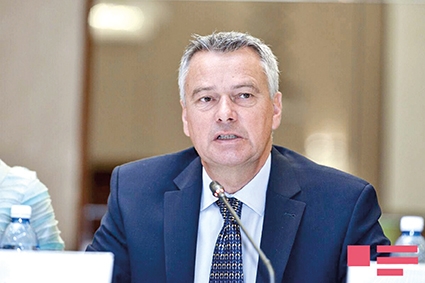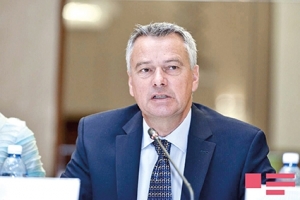On EuroDIG 2018
An annual conference "European Dialogue on Internet Governance (EuroDIG 2018)" was held on June 5-6 in Tbilisi. The EuroDIG was hosted by the Ministry of Economy and Sustainable Development of Georgia in co-operation with the Telecom Operators Association and the Georgian National Communications Commission.
We asked the MoESD Head of the Telecommunications, Information & Modern Technologies Dept., Eka Kubusidze, to comment on the choice of the host country. “The world has come a long way since the UN Secretary-General announced the establishment of the first Internet Governance Forum (IGF) for a multi-stakeholder dialogue on internet governance in 2006. Soon after, the EuroDIG started in 2008. We followed suit with a national Internet Governance Forum (GeoIGF), now in its 4th year and gaining regional recognition as stakeholders from our neighboring countries come to exchange views and experiences.”
For three days (there were some additional events on June 4, on the margins of the “proper” EuroDIG), Rooms Hotel was abuzz with delegates from different countries, agencies, regulatory bodies and NGOs, academia and civil society.
The spirit of inclusivity and the common goal, a free and honest exchange of experiences and challenges, brought together people of various backgrounds to discuss a wide range of issues, from trans-border cybercrime investigations to artificial intelligence, from challenges of e-commerce in Europe to regulating hate speech, from UNESCO internet universality to digitalizing Tusheti.
We sat down with the Head of Information Society of the Council of Europe, Patrick Penninckx, to find out more.
As a post-Soviet state, Georgia doesn’t have a long relationship with the free media and the European approach offers solutions like awareness-raising, media literacy, and critical assessment of content. Is Georgia ready for it?
Education is quite clearly one of the most important solutions, but at the same time, there are other stakeholders with important roles to play in tackling this problem. The government’s role is to regulate, to put barriers, to ensure that illegal or harmful content is removed. The Internet Service Providers (ISPs) through which the majority of the disinformation, mal-information and misinformation circulates, have the responsibility for the content that is transmitted and multiplied. The technical community dealing with the devices and algorithms has an important function of taking into account the human rights and data protection - not post-factum, but rather by design, in the process of developing the applications and products. The education system is a major stakeholder, but as yet, it is not sufficiently equipped to deal with the digital revolution that we’re facing. Civil society is not to be underestimated; its role is to warn users, to alert governments, to work with the ISPs. And then there’s the media itself, with the crucial task of debunking disinformation which comes through traditional media channels. So, I wouldn’t say that we focus exclusively on the users that need to be educated: there are different actors that are involved, and they have to be respectful of each others’ roles.
The CoE-commissioned a report on Hate Speech and Media Regulation based on experiences and cases in the Balkans, which, like Georgia, is post-Soviet, post-conflict. Recent narratives of intolerance in Georgia are very troubling. How do we counter them?
Very often, this is a form of disinformation aiming for a certain outcome, and that outcome could be a political change, an uprising of nationalists, or an ethnic cleansing. Ultimately, it’s a question of power in a given political context. It is very often used by populists, e.g the whole question of the migration crisis in most of Western Europe. As for the counter-narrative, it is extremely difficult to promote, first, because people like the “juicy” stories that create the images. Second, it’s difficult to track to which extent the counter-narrative actually reaches people that have been affected by the original story. It’s a complex problem that is present in all of the Western European countries today, all of the former Warsaw Pact countries which are now part of the EU, where strong nationalistic leaders take the foreground, promoting the course of action that defects from fundamental human rights issues, and very often defects from the state’s existing international commitments. It’s a very worrisome development, not exclusive to Georgia at all, but rather a tendency whereby mechanisms protecting free speech are being used and abused throughout Europe.
The report notes cases of “coded” words and explicitly incitng speech daily from certain media outlets. How do you COMBAT THIS WHEN THERE is no global definition for hate speech?
On the level of the Council of Europe, we use the definition (www.coe.int/t/dghl/monitoring/ecri/activities/GPR/EN/Recommendation_N15/REC-15-2016-015-ENG.pdf) by the European Commission on Racism and Intolerance (ECRI) – it has the parameters of what is considered hate speech. The European Court of Human Rights (ECHR) is always very careful in considering the balance between freedom of expression, which is a fundamental right, and legitimate requests to take down information that is perceived as discriminatory, hostile, inciting violence. The ECHR always applies a very restrictive definition of hate speech, as it is a very thin line to walk, and we have to be careful to adhere to pluralism in opinions.
This sentiment is echoed by Eka Kubusidze: “Even seasoned democracies of Western Europe are struggling when it comes to finding the right balance between the hate speech restrictions and keeping the freedom of speech, there is no single global standard that fits all. We’re currently working on the strategy, having asked the Council of Europe and the European regional office of ITU (International Telecommunication Union) to share their experiences in adopting guidelines on hate speech and on establishing regulatory frameworks.”
Could certain authoritarian regimes use the REGULATIONS: ASKING FOR THE REMOVAL OF HATEFUL CONTENT TO FURTHER THEIR GOALS?
Hate speech is largely about the context, and that leaves a lot of room for interpretation. The regulatory environment that is being developed in a very specific context may be used by totalitarian or monopolistic regimes, adapted to their own purposes. They may say, ‘see, they’re doing this restriction on freedom of expression in Germany, they’re doing it in the UK, why shouldn’t we be able to do the same?’ So, the states with stronger democratic traditions have to be very careful about the possible impact of their legislation on other countries, how it might be used and interpreted in a completely different context, leading to a negative effect on the plurality of opinions.
Lately, the issue of data protection has come to the fore. What is happening in the regulatory landscape to address that? Is the amendment to Convention 108 the answer?
There’s a Safe Harbor Agreement governing the exchange of data between the USA and the European Union. Then, the case brought forward by Austrian lawyer Max Schrems exposed deficiencies in the way Facebook collected and transferred his personal data, and eventually led to the invalidation of the Safe Harbor framework in September 2015. The EU-US Privacy Shield took its place, basically ensuring that the data protection of EU citizens in the United States was at an appropriate level. Additionally, there is the Generic Data Protection Regulation (GDPR), which came into force two weeks ago, also on the EU level. By contrast, Convention 108 is a global treaty which goes beyond the 47 states of the Council of Europe. The pan-European nature of the modernized Convention (www.rm.coe.int/16808ade9d) will allow us to do the checks and balances of data protection legislation in all of the countries which are party to the convention. It’s a crucial element that the amended version will provide the stable and predictable legal basis for data protection in the future. We’re working toward its opening for signatures globally, sometime in October 2018.
But this will be for the next EuroDIG to discuss – see you in Amsterdam in 2019!
By Kyra Devdariani











